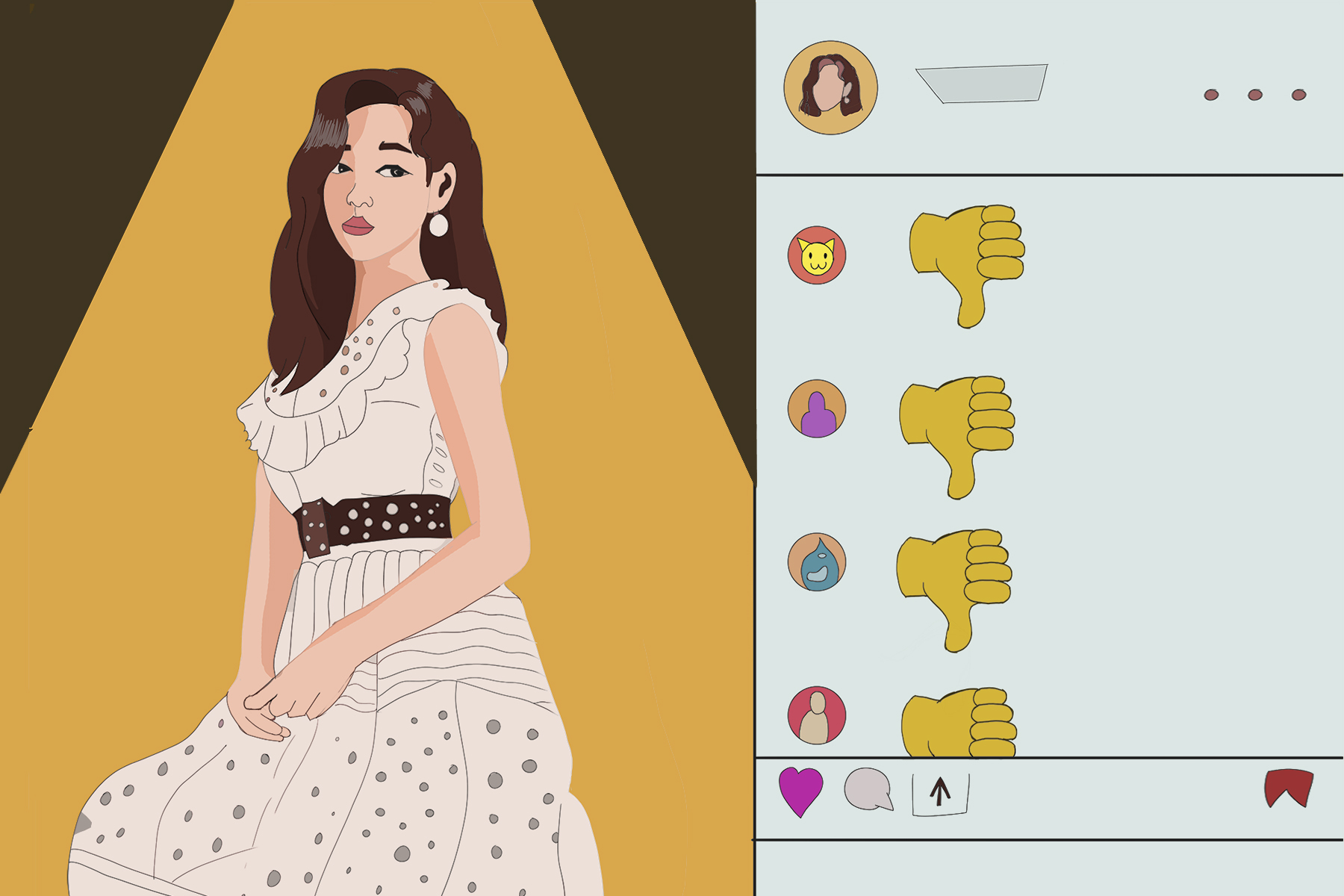Korean food, dramas and music have become popular on a global scale, seen with, among other things, BTS’s recent dominance on the Billboard charts. Other Korean artists have benefitted from the increased popularity of a “Korean invasion.” However, as K-pop continues to rise, its shady behind-the-scenes practices are being exposed. On Oct. 14, 2019, the Korean pop industry was hit with the tragic news of Sulli’s sudden passing. Her manager found her dead from an apparent suicide attempt after dealing with long bouts of depression and loneliness. Friends and fans were heartbroken and left sincere condolences for her. Her former company, S.M. Entertainment, expressed their sadness and held a private tribute and funeral for her. Other Korean stars in the entertainment industry cancelled events as a sign of mourning for the deceased starlet.
Sulli’s Status as a Star
Sulli, born as Choi Jin-Ri, was best known as a member of the popular girl group f(x). After leaving the group, Sulli was eager to succeed as an actress. However, her career was largely overshadowed by controversial scandals and “toxic fandom”. Her wild, eccentric and oversexualized image received extensive backlash and hatred online. She was criticized harshly for dating Choiza, a famous Korean rapper, because of the 14-year age gap. She was also bullied by thousands for her decision not to wear a bra, which some even went so far as to call it a “no-bra scandal.” Other controversies include her claims made about supporting abortion and feminism. She simply refused to conform to the traditional concepts of modesty and conservativeness, and was not afraid to discuss taboo topics in Korean society.
https://www.instagram.com/p/B2-7PgUBR7q/
She attempted to go against the double standard applied against women within the industry. According to Kevin Cawley, professor of East Asian studies at University College Cork in Ireland, women are seen as sex objects but are also “expected to adhere to outdated Confucian norms about sexual conduct in their private lives while men can do as they please.” The double standard shows that it’s harder for women to succeed within this industry that makes huge annual profits from commercializing stereotypical concepts such as the overly sexualized girl group, which groups such as Sistar and AOA are known for, or groups like G-Friend that portray a pure, innocent image.
Girl groups often have no say in these concepts and in the composition of their albums. In order to maintain a favorable public image, female idols are expected to not date and to stay away from controversy. Scandals have been known to end the careers of many popular female idols, such as Park Bom of 2NE1, when she received backlash for her changed appearance and for her drug scandal. Meanwhile, male idols are not subject to the same scrutiny. Idols such as Kim Heechul have been able to discuss taboo topics of smoking, sex and dating. While Sulli was surrounded by criticism for dating Choiza, he, on the other hand, faced little backlash and even proceeded to make jokes on “Saturday Night Live” about the relationship.
The K-pop Industry
Despite facing harsh cyberbullying, Sulli tried not to be bothered. In an appearance on JTBC’s “Night of Hate Comments,” she said that by caring about what others thought of her, she became obsessed with their opinions, and found it difficult to be herself.
It appeared that, on the surface, she was trying her best to remain positive and to live her best life. During his appearance on Channel A’s “Rumor Has It,” Sulli’s dear friend, Hong Suk Chun stated that, publicly, she tried to move beyond hate with resilience and positivity, but behind the scenes, Sulli was depressed and scarred by the overwhelming hate that she received.
https://www.instagram.com/p/B3RgCf4ByEB/
When things became difficult and she couldn’t take it anymore, Sulli requested that SM Entertainment take action against cyberbullies. However, the tragedy of it all was the fact that SM did nothing to quell the harsh comments.
Despite the double standard, Korean idols of both genders face challenges before and after they make their successful debut with hopes of reaching stardom. In an interview with Asian Boss, a former K-pop idol provided insight about the struggles.
Large amounts of time and money are spent training and preparing trainees to become famous. Korean entertainment agencies hope that their investment pays off and that there are favorable returns for stockholders. Trainees are recruited at a young age, usually during their adolescent or teenage years. They then are forced into slave-like contracts, which have unfavorable conditions and can then be extended for 10 to 20 years.
During the training process, trainees are expected to train up to 12 hours a day with no rest or breaks. Many are put onto restrictive diets and have to undergo cosmetic surgery to meet Korean beauty standards of having double eyelids, big eyes, a slim V-shaped jawline and a small pouty mouth. Before the stars are allowed make an income, they have to pay off the hundreds of thousands of dollars that are spent on training, food, housing and marketing. From the start of their careers, Korean idols are forced start out in debt.
In recent years, rampant trainee abuse has come to light, in which CEOs and powerful figures within agencies have been accused of sexual harassment and physical abuse against the trainees. The East Light filed a lawsuit against Media Line Entertainment, as members of the prominent band claimed that there was a cover-up made to hide the fact that producer Moon was physically punishing the young boys whenever they made mistakes during training. However, after tumultuous struggles, most Korean trainees will never debut, as agencies are extremely selective with picking the right individuals to invest in. It’s ultimately a game of survival, in which trainees survive by stepping on the backs of others and by adhering to strict standards.
After idols debut, most will continue to live in obscurity, with hopes that one breakout hit will push them to stardom. After years of failures, a large portion of groups will disband. Very few groups garner the spotlight; musical acts that are backed up by the biggest entertainment agencies (SM, YG and JYP) are more likely to succeed. Former idols find it hard to make a living after their respective careers flop, with many having to resort to part time jobs.
Expectations of success, fame and prosperity are shattered as promises become mere pipe dreams. More famous idols, such as Sulli, acquire fame and success, but are constantly under scrutiny. There’s a trade-off to be made, between the perks of stardom and the sacrifice of free will in the Korean celebrity-scape.
https://www.instagram.com/p/B19UDduhJ68/
The Taboo of Suicide in Korea
With the turn of the new millennium, there has been a rise in suicide rates within the K-pop music industry and in Korea as a whole. Statistics have shown that South Korea has one of the highest suicide rates among countries that are part of the Organization for Economic Cooperation and Development, with 2015 data showing that in Korea, there are nearly 30 suicides per 100,000 people.
Entertainers within the industry have it especially hard as the mentality and shadiness behind the K-pop industry has forced many idols and entertainers to become depressed. It’s difficult for many to cope with the pressures to live up to expectations set by consumers and companies. The musicians are seen as a commodity that can be sold, traded and exchanged on the K-pop market. Other entertainers, such as U-Nee and Jang Ja-Yeon chose to commit suicide after facing extensive guilt and sadness over behind-the-scenes sexual exploitation and renown actress Choi Jin Sil took her own life in 2008 after dealing with depression.
The untimely death of Sulli came shortly after the suicide of her former label mate, Kim Jonghyun, of popular boy group Shinee. Jonghyun shocked the world on Dec. 19, 2017 when he decided to say goodbye to the world. In his suicide note, he said, “I’m broken from the inside… The life of fame was not for me… They said it’s hard to bump up against the world and become famous.”
His personal thoughts within the note showcase the harsh pressures that are put on stars to uphold a reputable image, and to make music that sells. Like Jonghyun, most also struggle with post-traumatic stress disorder (PTSD) after horrific experiences within the industry. It also provides glimpses of how the industry, as well as Korea, fails to make mental health and suicide a serious topic of discussion. Suicide continues to be a taboo topic as it is deemed as shameful to talk about one’s personal problems. In South Korea, where Confucian norms continue to be binding, doing so means losing face and bringing dishonor to one’s family.
f(x)'s Luna Bids Farewell To Sulli With Heartfelt Message https://t.co/zqVrjUYBGU pic.twitter.com/5cbowIrkNU
— Soompi (@soompi) October 25, 2019
The Necessary Changes
After the heartbreaking deaths of Jonghyun and Sulli, people have become more outspoken about the need to do more to draw attention to mental health awareness. In the midst of Sulli’s passing, prominent figures including Kim Dongwan of Shinhwa and T.O.P of Big Bang have spoken out against cyberbullying and unfair industry practices. After dealing with his own struggles and attempting to take his own life in 2017, T.O.P wrote that, “ Malicious comments are murder. Freedom comes with responsibility.”
In his post, Dongwan offers a passionate critique about the unfair conditions that agencies impose on entertainers with many fighting a battle within themselves, of whether it was the right decision to make, to trade blood, sweat and tears for money and fame. Critics have called for more legislation, with the lobbying for the passing of Sulli’s Law to honor the starlet. Sulli’s Law discusses reintroducing the “real name” mandate, which means that the internet service provider has to collect the user’s real name and ID number before providing the service. By doing so, it would make users more wary of posting malicious comments, as they would be liable for prosecution. However, it would bring up issues of censorship. Freedom of speech would be revoked as netizens are afraid to now voice their opinions on different topics.
At the end of the day, people have to realize that celebrities are people too. Instead of putting them on pedestals and applying strict and unrealistic standards to them, it’s important to accept them for who they are. Words do have power, as they are like stones that batter the souls of these individuals. In addition to all that, they also have to deal with the chaotic politics of the industry. Ultimately, fans have to appreciate the music, along with the madness behind the music.
















